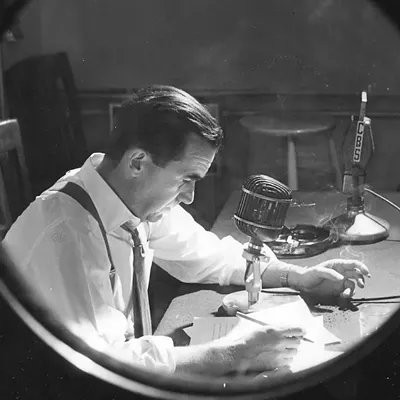It sounds like quite a bit to swallow, but it's not nearly as oppressively artsy as it might appear. Tracy + the Plastics performances have been well received everywhere from basement punk shows to high-profile art museums. The band was even asked to perform in the 2004 Whitney Biennial, an internationally renowned showcase of contemporary art.
A Tracy + the Plastics exhibition consists of equal parts performance art and DIY punk. (The term "electro clash" comes to mind.) Onstage, Greenwood takes on the psyche of lead vocalist 'Tracy' while interacting with 'Nikki' and 'Cola' via video projection. Tracy carries on dialogue with the Plastics whilst launching into song over sampled drumbeats and synths. The music dots, weaves and bounces all while Tracy's sometimes sultry, often shrill, screamo voice raps queer-friendly lyrics reminiscent of Le Tigre and Bikini Kill.
And in the spirit of radical feminist punk bands (Bikini Kill, The Need et al.), it's no wonder that in 2001 Greenwood found a home for Tracy + the Plastics on Portland-based Chainsaw Records. On the 12 tracks of their debut, Muscler's Guide to Videonics -- lo-fi in production and just shy of 25 minutes -- Tracy has her way with you in what feels like a release from years of repression. It's ideology even recalling Crass' anarcho punk masterpiece, Penis Envy. The opening track, "City," alone comes at you with a vengeance that would have the faint of heart running.
Three years later saw 2004's Culture for Pigeon on hipster imprint Troubleman Unlimited. The label, whose roster includes such diverse acts as Unwound to Devendra Banhart, was another positive shift for the project. While not being nearly as visceral as Muscler's Guide to Videonics in production or execution, Culture for Pigeon has afforded Tracy more room to explore the softer side of her voice that she has learned to exploit beautifully.
Greenwood has been known to describe the Tracy + the Plastics invention as "Lesbo for Disco" and makes it no secret that she considers herself a radical lesbian. But that isn't to say that she doesn't have something to offer those of a more hetero persuasion. Her exploration of the self and the dualities of personality are enough to keep anyone intellectually occupied for quite a while.
Tracy + the Plastics' performances can seem artsy-fartsy. But those in the rock community who tend to scoff at Tracy usually are those who haven't actually experienced her or given her any serious consideration. In other words, not every show has to have wailing guitars to rock. And Greenwood's music is quite powerful despite not having any live instruments onstage. By the sheer force of her ambition, one can't help wanting to know the whole story behind the performance -- like, what exactly is this woman screaming about? And will Greenwood ever reconcile these personality abstractions into a single ego? That would defeat the purpose.
Tracy + the Plastics plays at Unified Groove Merchants, 2607 N. Monroe St., on Saturday, March 5, at 8 pm, with Nineteen Points of Nowhere and Fumaric. Tickets: $5. All ages. Call 326-4842.














